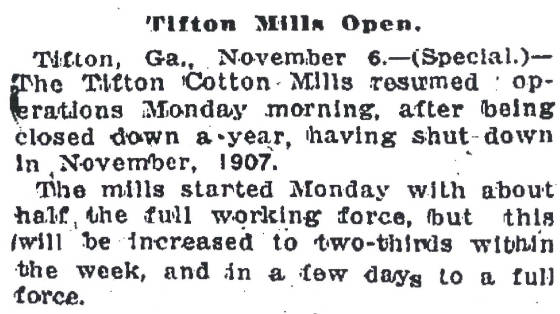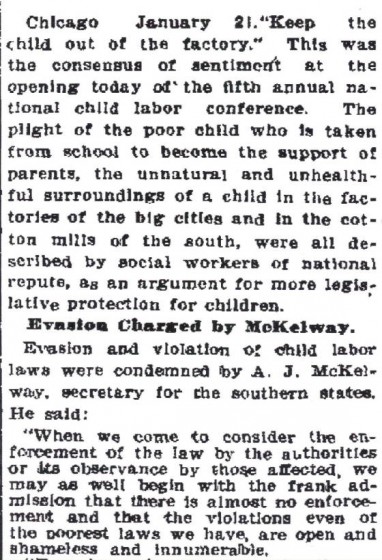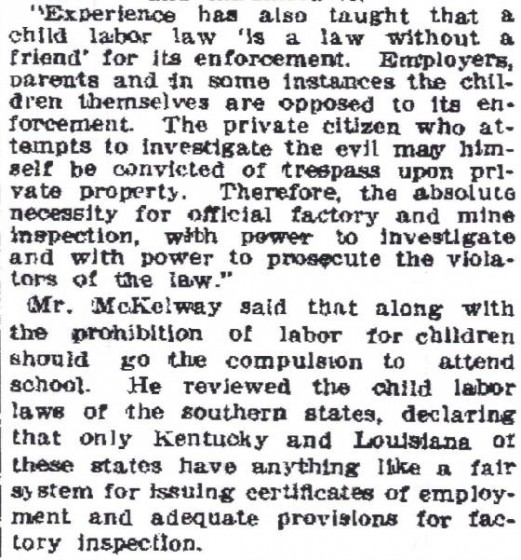The following is from The Survey, 1906
The New Child Labor Law in Georgia: Samuel McCune Lindsay, Secretary of the National Child Labor Committee
Georgia is the industrial leader of the new industrial South. At least one quarter of all the children under fourteen years of age employed in the cotton mills of the entire South are found in Georgia. Until August 1st, it was the only southern state without a child labor law of some sort, and for over two years the women’s clubs, the Georgia Child Labor Committee and the National Child Labor Committee had kept up so active a campaign of education that the child labor issue was easily one of the most talked about political issues of the day. It played no little part in the gubernatorial contest at the recent primaries between Hoke Smith and Clark Howell. Other states, especially Alabama and the Carolinas, watched Georgia and decided that they could make no advance in their child labor legislation until Georgia was willing to act with them in equalizing competitive labor conditions. For two years, therefore, Georgia has discussed the question, but refused to legislate and by so doing has held back practically all child labor reform in the South.
On August 1st, when Gov. Terrell signed the first child labor law of the state, there was a general rejoicing among all the true friends of the children throughout the South because it meant more than protection for the children of Georgia. It meant opening the way for a forward movement in Alabama and the Carolinas, and also in Texas and Virginia, where child labor in the mills is on the increase. Georgia is now in position to assume a new and more desirable leadership, and many of her able and high-minded citizens will welcome her removal from the black-list of states indifferent to the welfare of their children.
It was a hard fought legislative battle too, which terminated with the passage of the Bell bill which became law with the signature of Gov. Terrell on August 1st. The National Committee moved its southern headquarters to Atlanta nearly a year ago in order to be of the greatest assistance to the state and local committees. The bill, which passed the lower house of the assembly last year and was defeated in the senate by a real majority of only four votes, was made stronger this year, and the wave of feeling which the women of Georgia aroused all over the state after the defeat of a year ago was manifest by the almost unanimous vote in favor of the bill in both houses this year.
The skillful management of many difficult situations by Dr. A. J. McKelway, representing the National Committee, and the work of Rev. Dr. C. B. Wilmer, secretary of the State Committee, Senator Allen D. Candler, ex-governor of the state and chairman of the State Committee and Hon. Madison Bell, a young Atlanta attorney, who began this work upon his entrance into public life a year ago, deserve special mention and are worthy of special praise.
The new child labor law in Georgia goes into effect at once and prohibits the employment in any factory or manufacturing establishment of children under ten years of age under any circumstances. After January 1, 1907, this prohibition applies to children under twelve except when a sworn certificate from the county ordinary (the official title of the probate judges in Georgia) states that the child in question under twelve is an orphan with no other means of support or has a widowed mother or disabled father dependent on its earnings. After January 1, 1908, night work between 7 P. M. and 6 A. M. is prohibited to all children under fourteen in factories, and all such children under fourteen must also after this date for day work be able to read and write and have had twelve weeks’ schooling, at least six of which must have been consecutive. Such school attendance is further required until eighteen years of age for children entering employment at fourteen or less.
The standard established in the new law is, of course, a low one compared with what is now attempted in the more advanced states like New York, Massachusetts, Illinois and Colorado, but it is at least a good beginning. It does not extend its protection beyond factory children nor touch the evils of messenger service, street trades, tenement house work, etc., nor does its prohibition of night work and its educational test become effective for nearly two years. It will be necessary also for the friends of the measure to provide private agencies to look after its enforcement until the state can be induced to provide factory inspectors, without which such legislation is usually of little avail.
The automatic raising of the standard as the people become accustomed to the workings of the new law is a good feature in principle, although entirely too conservative in terms and too slow in operation in the present instance. Georgia has made only a good start in the right direction. It remains for the friends of the children to perfect their work and at subsequent sessions of the Georgia legislature to secure state factory inspection, to increase the age limits and educational qualifications, and to extend the provisions of the law to mercantile establishments and the protection of children engaged in the messenger service and in the delivery of merchandise.

The following is excerpted from the Southeastern Reporter (1914)
Gibbs vs. Tifton Cotton Mills, Court of Appeals of Georgia, Sept. 19, 1914.
(Below are the details of an accident at the mill in 1904. A nine-year-old girl worker was injured. She brought suit against the mill in 1913, and won the case.)
Wade, J. Ellen Gibbs, a minor, by her next friend, brought suit in the city court of Tifton to the October term, 1913, against the Tifton Cotton Mills; alleging that in the year 1904, when she was a small child, 9 years old, she was working for the Tifton Cotton Mills at a spinning machine, and while so employed it was necessary for her to keep certain parts of the said machine, known as “travelers,” properly oiled, and it was customary for her and the other employees operating such spinning machines to procure oil from the draft gear head, which was an iron frame covering the cogs on the steam rollers that operated the spinning frame, and which when in proper condition covered all of the cogs, and protected and prevented anyone from being caught by them and injured; that in obtaining grease from the draft gear head to oil the travelers, it was necessary to reach under the said head, where the grease leaked or worked out therefrom, and get on her finger the small amount necessary to oil the travelers; that to operate the spinning frame properly, it was customary (and it was generally known or could have been known by the defendant by the exercise of ordinary care and diligence) for its employees to secure from the said gear heads oil or grease for use on the “travelers”; that on account of the tender years of the plaintiff, she did not possess sufficient mental capacity to appreciate the danger in coming in contact with the cogs above described, and in keeping her hand free from them; that the operation of the machine was dangerous, and it was the duty of the defendant to warn her of such danger and to instruct her how to operate the machine, but the defendant failed so to warn or instruct her; that in the spring of the year 1904, after she had been working at the said machinery for 30 or 60 days only, and while engaged in operating it in the performance of her duties she reached under the draft gear head in order to obtain oil to grease or oil the “travelers,” and in so doing her right forefinger was caught in the cogs, and mashed, ground, and mutilated up to and past the first joint, so that it was necessary to have the finger amputated, and it was amputated just above the first joint; that the cogs which crushed her finger should have been covered with a proper cap or covering, and, had they been so covered, as it was the duty of the defendant to have them covered, her finger would not have been injured as aforesaid; that on account of the cap being off from the bottom of the gear head, it was impossible for her to notice that it was off and the cogs thus exposed, and she did not notice that it was off and the cogs exposed; but, on account of her tender years, even if the exposed cogs had been visible, she would not have had sufficient capacity to appreciate the danger incident thereto and to avoid the injury, and the defendant was negligent in putting her at work at the machine with the cogs thus exposed. These allegations, together with others necessary as to the extent of the injury and the resulting consequences, made up, with some amplification, the plaintiff’s petition. The evidence as a whole sustained the case as laid.

